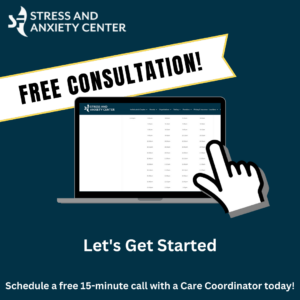Eating disorders such as anorexia nervosa, bulimia nervosa, and binge-eating disorder are serious conditions that not only have a profoundly negative effect on physical and mental health, but are also difficult to treat. These problems often start in adolescence and in early adulthood, although they can occur at any age. The disordered eating behaviors that result can affect the body’s ability to get adequate nutrition and cause physical damage, with potentially serious long-term health consequences. While the exact cause of eating disorders is unknown, certain risk factors that can contribute to their development are well understood, including stress and anxiety. Understanding how these factors can trigger, influence, and exacerbate eating disorders is essential for effectively treating them.
Can Anxiety Cause an Eating Disorder?
Stress and anxiety are a part of life, as much as we might wish otherwise. Sometimes stress can be helpful, such as when it motivates us to get an important project done before a deadline or study harder before a big test. However, when anxiety becomes unmanageable, persistent and overwhelming worry can make it impossible to function on a day-to-day basis or to maintain healthy relationships. While anxiety disorders may occur on their own, they can also occur with other mental illnesses such as depression.
Anxiety disorders are common among those also struggling with an eating disorder. According to statistics from the National Institute of Mental Health, 47.9% of those with anorexia nervosa, 80.6% of those with bulimia nervosa, and 65.1% of those with binge-eating disorder were also diagnosed with some form of anxiety disorder. The most common types of anxiety disorders associated with eating disorders are obsessive-compulsive disorder (OCD), social anxiety disorder (SAD), generalized anxiety disorder (GAD), and post-traumatic stress disorder (PTSD). Anxiety and eating disorders can interact in complex ways, which makes it essential not to overlook the role the former plays when treating the latter.
It’s easy to see how anxiety or a stressful life change—such as going away to college, family issues, a new job or promotion, or moving—could push someone already at risk into developing an eating disorder. A family history of eating disorders, having been teased or bullied about weight, past trauma, and/or frequent dieting are all factors that are known to increase the risk of an eating disorder, and adding stress to the mix may be the catalyst that provokes problematic eating behaviors. However, the relationship is more complicated than that.
Understanding the Connection between Anxiety and Eating Disorders
Eating disorders are progressive—they often start intentionally as a way to feel a sense of control. Once a habit forms, though, it is easy to lose control over disordered eating behaviors and exercise habits. People with eating disorders become compelled to continue their destructive behaviors, which tend to worsen over time. In turn, the consequences of those behaviors can amplify the stress and anxiety they were initially meant to help relieve.
For example, someone with anorexia may begin severely restricting their food intake, repeatedly measuring their weight, or undertaking an extreme exercise regimen as a way of trying to cope with anxiety and a distorted body image. They may also develop ritualistic behaviors such as cutting food into tiny bites or weighing everything they eat. However, having to hide these behaviors from concerned family, friends, or colleagues can become a new source of stress and anxiety. In addition, malnutrition can also make anxiety worse.
Anxiety, stress, and bingeing can create a different dynamic that nevertheless serves to amplify the negative feelings that provoke disordered eating. Instead of avoiding food, people with bulimia or binge-eating disorder have episodes in which they consume large amounts of food in a short period of time. Negative emotions like sadness, loneliness, guilt, or hopelessness are often identified as triggers for a binge, which might begin with eating comfort foods to self-soothe but balloon into uncontrolled eating. Because this releases brain chemicals like serotonin, it works in the short term. In bulimia, that binge is followed by a purge (such as vomiting or laxative abuse) in response to the uncomfortable physical and emotional symptoms of the binge. The immediate feeling of relief, for both those with bulimia and people with binge-eating disorder, is quickly replaced by feelings of guilt and shame.
As with anorexia, binge-eating (whether it is followed by purging or not) is accompanied by secrecy and anxiety. Those suffering from these disorders tend to hide food, eat alone, and otherwise go to great lengths to hide their binges. Embarrassment over their lack of control over their behaviors may also amplify the negative emotions that are more likely to spark binge episodes. Physical consequences such as gastrointestinal problems or weight gain may become an additional source of stress and anxiety as well.
Treating Eating Disorders and Anxiety
While someone might not develop an eating disorder from anxiety alone, when an anxiety disorder is also present, it is necessary to treat both conditions simultaneously. Otherwise, symptoms of anxiety can worsen disordered eating or cause discouraging relapses during treatment. Learning how to reduce anxiety and develop healthier coping mechanisms can help break the cycle of self-destructive behavior.
At the SF Stress & Anxiety Center, our therapists specialize in treating anxiety, using evidence-based methods to produce lasting relief. If anxiety has you feeling stuck, overwhelmed, or hopeless, we can help. To keep treatment accessible and convenient, we offer both in-person and online therapy. Schedule your free initial phone consultation with one of our compassionate Care Coordinators to be matched with the right therapist for you.


